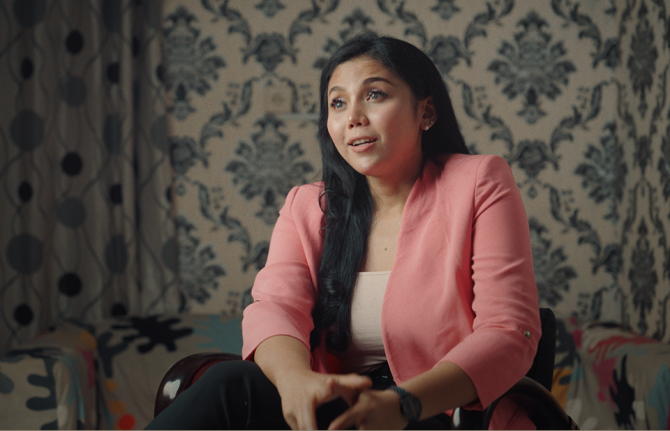




Feature Story
Healthcare access is fraught for trans people in Asia and the Pacific. Communities are working to change this.
31 March 2023
31 March 2023 31 March 2023Zara Fauziah is a transgender woman from Indonesia. She learned she was living with HIV in 2017, but for four years coped with her diagnosis alone. The hospital where she could receive treatment wasn’t welcoming.
Rere Agistya, another Indonesian transwoman, explains why: “If we come to get services or to get checked for HIV, we often get lectures with the purpose to ‘cure’ us. Most of the time they blame our activities: ‘Well you know you are a man. Why do you want to be a woman?’”
Many countries in the Asia Pacific region lack national guidelines on transgender care. As a result, healthcare workers often miss the mark on delivering non-discriminatory and medically appropriate services.
This is a critical gap for the AIDS response given the disproportionately high HIV rates among transgender people. HIV prevalence for the community is around four percent in India and the Philippines. In Cambodia, Indonesia, Malaysia and Thailand, roughly one in ten transgender women lives with HIV.
Samira Das lives in Chingrihata, India. She is a Hijra (Hijras include transgender and intersex people).
“When my family members came to know I am HIV positive they separated my utensils and other things. They got me treated but they kept me in isolation. I stayed there, bearing everything,” she said.
“People nowadays don’t die from HIV. They die from stigma and discrimination surrounding their physical and mental health and sometimes surrounding their sexuality as well as other sociodemographic factors,” Indonesian transgender physician and researcher, Dr. Alegra Wolter explained. “I’ve seen trans people who stop HIV medications because they don’t get the proper mental health services.”
But Dr. Alegra emphasises that the issue goes beyond HIV. Transgender people have inadequate access to everything from primary healthcare to hormonal therapy. With support from the Robert Carr Fund, Youth LEAD partnered with the Asia Pacific Transgender Network (APTN) to conduct a situation analysis on trans youths’ access to healthcare in Indonesia, Thailand and the Philippines.
“We conducted the study to raise the visibility of young trans people in the conversation around trans rights and healthcare, especially since they experience stigma and discrimination both as young people and as trans people,” explained Leo Villar, Youth LEAD’s Communications and Project Officer. “The study showed that young people seek knowledge from peers and undergo do-it-yourself treatments. This could lead to incorrect healthcare information and the misuse of hormones or HIV drugs.”
Preliminary findings from the online study commissioned in December 2022 found that many transgender people between ages 18 and 30 endure systemic discrimination and abuse when accessing healthcare.
“I experienced an incident where an officer asked for my identification and made fun of me. This made me feel uneasy as it occurred twice. As a result, I have been avoiding healthcare services,” one survey respondent said.
Researcher, Dr. Benjamin Hegarty, noted that more than half (52%) the study participants strongly agreed that they worried about being negatively judged because of their gender identity or sexuality when accessing care. Around one-third thought this could negatively impact their evaluations and diagnoses. Asked about their top priorities for healthcare and funding, the majority of respondents pointed to the need for gender clinics, access to universal health coverage as well as counseling and mental health services. Also high on the list were trans-related health research and education about gender diversity.
APTN has just launched the Towards Transformative Healthcare Module. This is a self-paced, interactive online training which is designed as an introductory resource on trans competent and gender-affirming healthcare for medical professionals and other healthcare workers in Asia and the Pacific. This includes those working in primary care and community-based health services.
The module uses a rights-based approach that departs from “pathologising models” that treat transgender people as abnormal. Instead, it promotes transformative and culturally sensitive care. Twelve topics are covered including gender diversity, mental health, sexual and reproductive health and gender-affirming care.
“Through this module, healthcare providers and trans clients can learn how to work together to create positive change and achieve HIV epidemic control,” said APTN Executive Director, Joe Wong. “We are emphasising core principles which can be applied by healthcare professionals even in areas with limited resources and training opportunities.”
The Southeast Asia Stigma Reduction Quality Improvement (QIS+D) Network and Community of Practice are co-convened by the University of California, San Francisco, the Asia Pacific Network of People Living with HIV (APN+) and the UNAIDS Asia-Pacific Regional Support Team. As part of their shared aim to reduce stigma and discrimination in healthcare settings, these initiatives seek to improve the health experiences of trans people by forging partnerships among providers, policymakers and communities.
“Changes can be made at the facility and community levels that make a huge difference in the lives of transgender people,” said Quinten Lataire, UNAIDS’ Regional Human Rights and Law Adviser. “Collaborating with communities, peer navigation and building friendly clinic services are proven approaches. At the same time transgender clients need training about how to navigate care, along with counselling so they can process the issues around their gender identity.”
Online spaces can play a key role in this community support function. For example, using the UNAIDS COVID-19 Communications Grant, APTN developed a COVID-19 Trans Resilience Social Media Tool Kit that included content on mental health, financial security, social protection and human rights.
Ms Fauziah’s experience bears out the game-changing role communities can play. In 2021 she connected with the organization Sanggar Swara. They have not only supported her treatment adherence but provided emotional support.
“It’s not your job to judge people. When your patient is someone with a different gender or sexual orientation, they only need your help. We need care and we also need space to be ourselves and not have to hide,” Ms Fauziah said.
View APTN’s video “The cost of stigma: transgender individuals living with HIV struggling to access healthcare” (129) The Cost of Stigma: Transgender Individuals Living with HIV Struggling to Access Healthcare - YouTube
Video
Region/country
- Asia and Pacific
- Australia
- Bangladesh
- Bhutan
- Brunei Darussalam
- Cambodia
- China
- Democratic People's Republic of Korea
- Federated States of Micronesia
- Fiji
- India
- Indonesia
- Islamic Republic of Iran
- Japan
- Kiribati
- Lao People's Democratic Republic
- Malaysia
- Maldives
- Marshall Islands
- Mongolia
- Myanmar
- Nauru
- Nepal
- New Zealand
- Pakistan
- Palau
- Papua New Guinea
- Philippines
- Republic of Korea
- Singapore
- Solomon Islands
- Sri Lanka
- Thailand
- Timor-Leste
- Tonga
- Tuvalu
- Vanuatu
- Viet Nam
- Samoa



